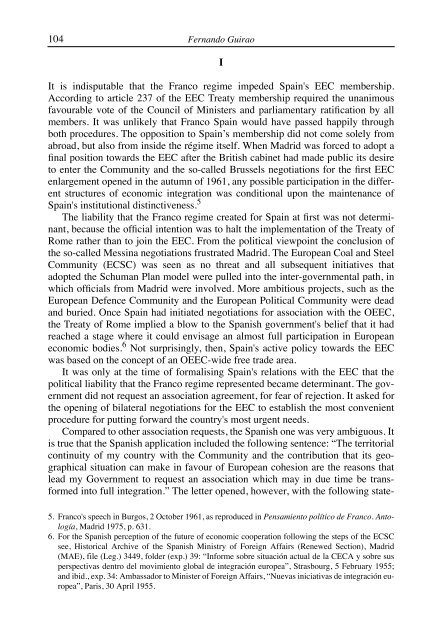Journal of European Integration History – Revue d'histoire de l'
Journal of European Integration History – Revue d'histoire de l'
Journal of European Integration History – Revue d'histoire de l'
- No tags were found...
You also want an ePaper? Increase the reach of your titles
YUMPU automatically turns print PDFs into web optimized ePapers that Google loves.
104Fernando GuiraoIIt is indisputable that the Franco regime impe<strong>de</strong>d Spain's EEC membership.According to article 237 <strong>of</strong> the EEC Treaty membership required the unanimousfavourable vote <strong>of</strong> the Council <strong>of</strong> Ministers and parliamentary ratification by allmembers. It was unlikely that Franco Spain would have passed happily throughboth procedures. The opposition to Spain’s membership did not come solely fromabroad, but also from insi<strong>de</strong> the régime itself. When Madrid was forced to adopt afinal position towards the EEC after the British cabinet had ma<strong>de</strong> public its <strong>de</strong>sireto enter the Community and the so-called Brussels negotiations for the first EECenlargement opened in the autumn <strong>of</strong> 1961, any possible participation in the differentstructures <strong>of</strong> economic integration was conditional upon the maintenance <strong>of</strong>Spain's institutional distinctiveness. 5The liability that the Franco regime created for Spain at first was not <strong>de</strong>terminant,because the <strong>of</strong>ficial intention was to halt the implementation <strong>of</strong> the Treaty <strong>of</strong>Rome rather than to join the EEC. From the political viewpoint the conclusion <strong>of</strong>the so-called Messina negotiations frustrated Madrid. The <strong>European</strong> Coal and SteelCommunity (ECSC) was seen as no threat and all subsequent initiatives thatadopted the Schuman Plan mo<strong>de</strong>l were pulled into the inter-governmental path, inwhich <strong>of</strong>ficials from Madrid were involved. More ambitious projects, such as the<strong>European</strong> Defence Community and the <strong>European</strong> Political Community were <strong>de</strong>adand buried. Once Spain had initiated negotiations for association with the OEEC,the Treaty <strong>of</strong> Rome implied a blow to the Spanish government's belief that it hadreached a stage where it could envisage an almost full participation in <strong>European</strong>economic bodies. 6 Not surprisingly, then, Spain's active policy towards the EECwas based on the concept <strong>of</strong> an OEEC-wi<strong>de</strong> free tra<strong>de</strong> area.It was only at the time <strong>of</strong> formalising Spain's relations with the EEC that thepolitical liability that the Franco regime represented became <strong>de</strong>terminant. The governmentdid not request an association agreement, for fear <strong>of</strong> rejection. It asked forthe opening <strong>of</strong> bilateral negotiations for the EEC to establish the most convenientprocedure for putting forward the country's most urgent needs.Compared to other association requests, the Spanish one was very ambiguous. Itis true that the Spanish application inclu<strong>de</strong>d the following sentence: “The territorialcontinuity <strong>of</strong> my country with the Community and the contribution that its geographicalsituation can make in favour <strong>of</strong> <strong>European</strong> cohesion are the reasons thatlead my Government to request an association which may in due time be transformedinto full integration.” The letter opened, however, with the following state-5. Franco's speech in Burgos, 2 October 1961, as reproduced in Pensamiento político <strong>de</strong> Franco. Antología,Madrid 1975, p. 631.6. For the Spanish perception <strong>of</strong> the future <strong>of</strong> economic cooperation following the steps <strong>of</strong> the ECSCsee, Historical Archive <strong>of</strong> the Spanish Ministry <strong>of</strong> Foreign Affairs (Renewed Section), Madrid(MAE), file (Leg.) 3449, fol<strong>de</strong>r (exp.) 39: “Informe sobre situación actual <strong>de</strong> la CECA y sobre susperspectivas <strong>de</strong>ntro <strong>de</strong>l movimiento global <strong>de</strong> integración europea”, Strasbourg, 5 February 1955;and ibid., exp. 34: Ambassador to Minister <strong>of</strong> Foreign Affairs, “Nuevas iniciativas <strong>de</strong> integración europea”,Paris, 30 April 1955.
















